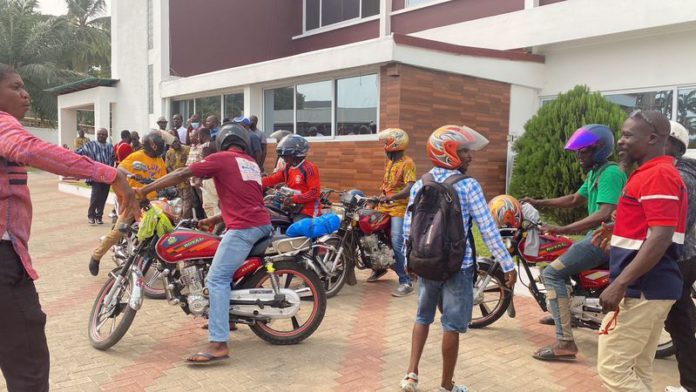Persons wishing to operate commercial motorcycles or tricycles, commonly known as ‘Okada’, must now be at least 25 years old and either employed by a licensed company or belong to a recognized transport union, according to a new draft legislative instrument (LI).
The new Legislative Instrument (LI) was drafted to amend the existing one, Road Traffic Regulations, 2012 (Legislative Instrument 2180).
The Transport Minister, Joseph Bukari Nikpe, who addressed the consultationin Accra on Monday, April 7, 2025, emphasized that the primary aim of the new regulations is to enhance safety and ensure that all operators meet the necessary competency standards.
“Our utmost priority is the safety and welfare of the riders and passengers. We are introducing a new licensing regime to better monitor commercial motorcycles and tricycles and improve overall safety,” he said.
The draft regulations also introduce specific requirements for riders. Not only having to be at least 25 years old to legally operate a commercial motorcycle or tricycle, but also riders must possess a valid National Identification Card, and pass several tests, including a proficiency test, an oral test, a theoretical test, and an eye test. They must also wear a certified helmet, which will have a unique number on it, and ensure that their passengers also have access to a helmet.
Furthermore, riders must adhere to all traffic laws, including speed limits, and are required to have their commercial rider’s license renewed every two years.
According to the draft regulation, failure to comply will result in a fine of 100 penalty units or imprisonment, or both. This provision seeks to bring a sense of organization and accountability to the growing Okada sector, which has expanded rapidly in recent years due to its affordability and convenience.
Mr. Nikpe highlighted that motorcycles and tricycles have become essential modes of transport in many parts of Ghana, particularly in urban centers where traditional taxis and buses are often unable to access. However, the increase in their usage has also led to a rise in road traffic accidents and fatalities.
The consultation provided a platform for stakeholders to discuss the proposed regulations and provide feedback. Mr. Nikpe urged participants to engage in open and practical discussions, which would help shape the final version of the regulations.
“Through this dialogue, we hope to create a comprehensive regulatory framework that will stand the test of time,” he said.
The new regulations will also establish specific requirements for commercial motorcycle and tricycle unions. These unions will be required to comply with a code of conduct, provide refresher courses for riders annually, and maintain an electronic database of all members. Additionally, operators must meet certain financial and operational standards, such as having a physical presence in at least eight administrative regions and owning a fleet of at least 50 motorcycles or tricycles in each region.
Participants included representatives from the Motor Traffic and Transport Department (MTTD) of the Ghana Police Service, the Ghana Private Road Transport Union (GPRTU), the association of Okada riders, and other relevant stakeholders in the transport sector.
The rise of Okada operations has been a double-edged sword for Ghana. While it provides much-needed transportation, especially for short trips, it has also brought with it several challenges. The government has long recognized the need for regulation, with former President John Dramani Mahama pledging during the 2016 elections to implement effective regulations to improve safety and job security for riders.
In line with this commitment, a 13-member committee was formed last month to develop a regulatory framework for the commercial use of motorcycles and tricycles. This committee, consisting of officials from the Ministry of Transport, the Office of the Attorney General, and other government bodies, worked to develop a framework that focuses on safety, inclusivity, and innovation.

